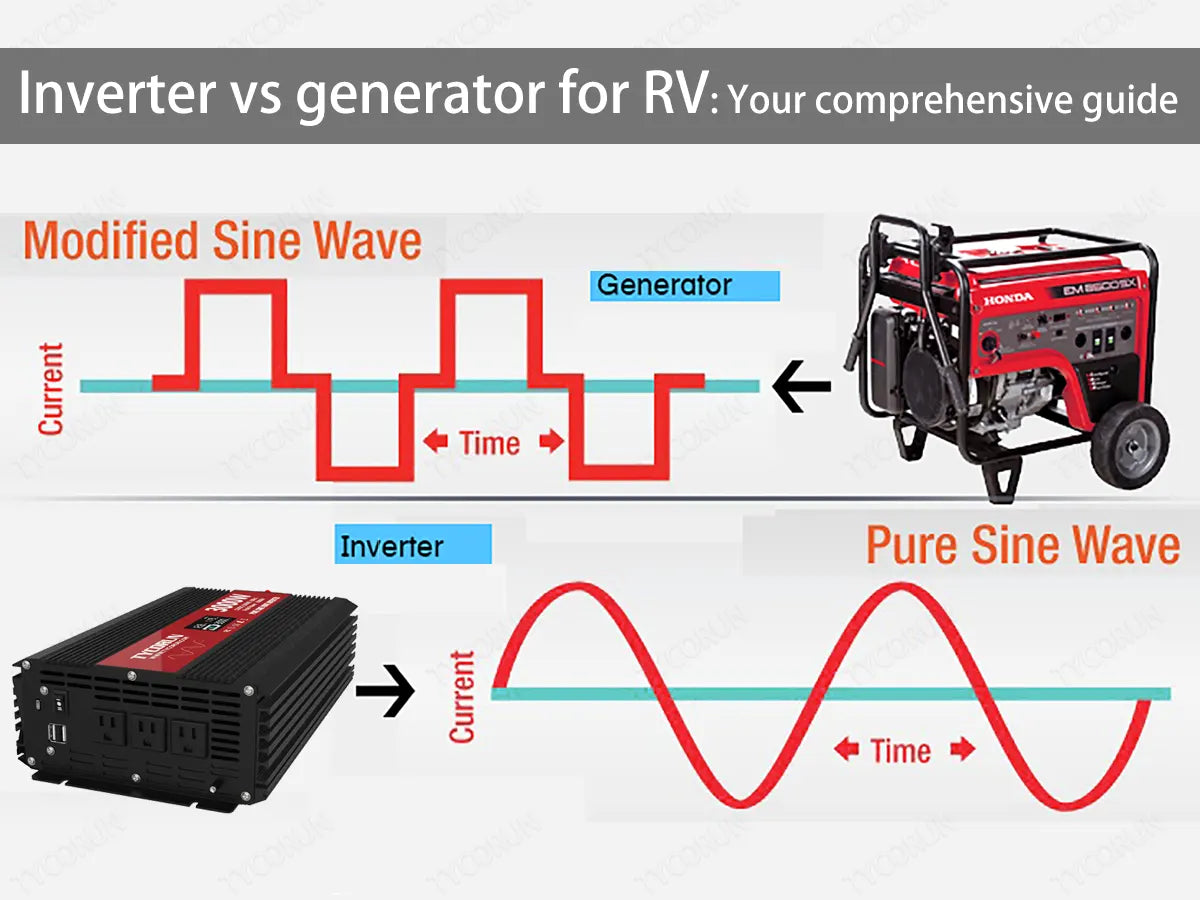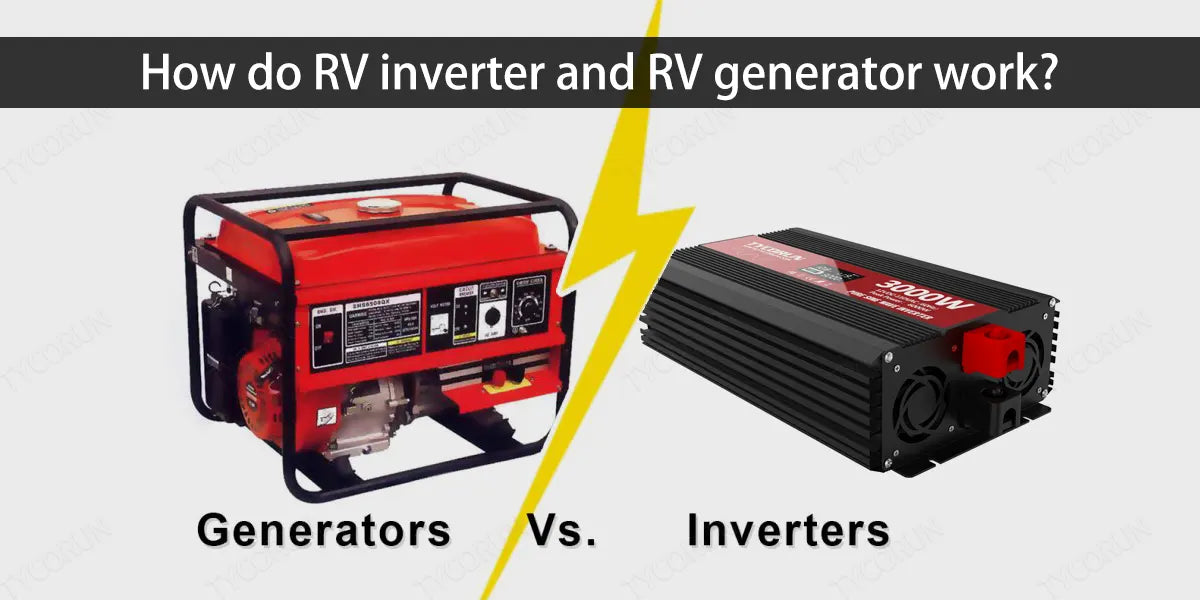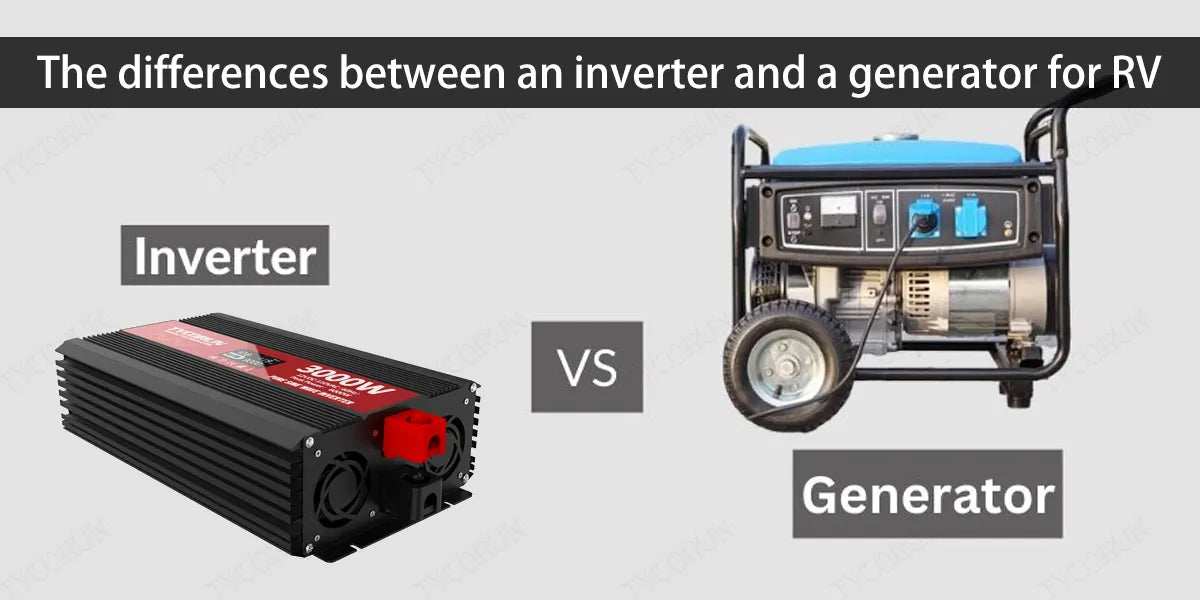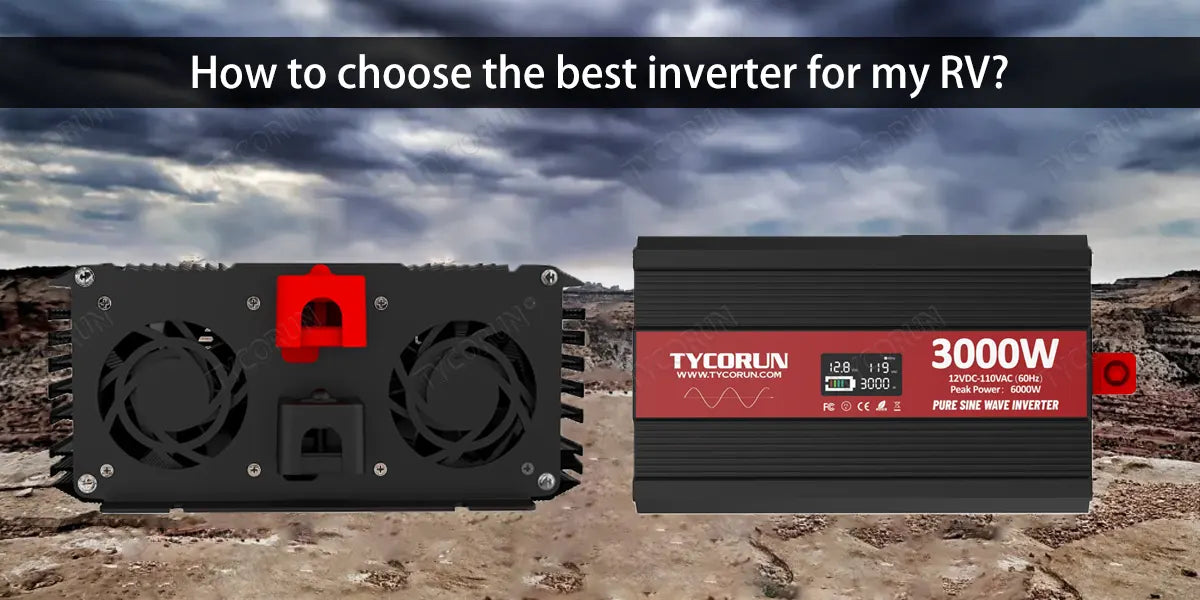
In this comprehensive exploration of RV power solutions, we delve into the seamless integration of inverter vs generator for RV. From enhancing everyday electronics to powering high-demand appliances, we unravel the benefits and techniques of combining these cutting-edge technologies.
Main content:
- What is an RV inverter, and what is an RV generator?
- How do RV inverter and RV generator work?
- The differences between an inverter and a generator for RV
- Pros and cons of an inverter for RV
- Pros and cons of a generator for RV
- Do I need both inverter and generator for my RV?
- What size inverter do I need for my RV?
- RV inverter vs generator - the applications
- How to choose the best inverter for my RV?
- FAQs
1. What is an RV inverter, and what is an RV generator?
An RV inverter transforms DC (direct current) power from the RV's batteries into AC (alternating current) power. This transformation enables the operation of electronic devices such as laptops, chargers, and small appliances , working with off-grid solar batteries.
The RV generator on the other hand, works as a self-contained power source - a mini power station and generates electricity to operate various appliances in the RV. Fueled by gasoline, diesel, propane, the generator proves valuable in areas without electrical hookups during camping trips, providing necessary power for air conditioners, microwaves, and other high-power devices.

2. How do RV inverter and RV generator work?
- RV inverter:
The RV inverter functions by transforming direct current (DC) power derived from your RV's batteries into alternating current (AC) power. This conversion is very important as most of our household appliances operate on this AC power.
- RV generator:
Comparing inverter vs generator for RV, conversely, an RV generator operates as an independent power source, generating electricity to operate various appliances within your RV. This adaptable device, often a focal point in the inverter vs generator for RV decision-making process, can be fueled by gasoline, diesel, propane.
3. The differences between an inverter and a generator for RV
- Inverter for RV:
In the ongoing evaluation of inverter vs generator for RV, an RV inverter transforms DC power from the batteries into AC power, enabling the operation of household appliances. It operates silently, is lightweight, and is well-suited for running various devices. However, it may struggle with high-power demands and is contingent on voltage and wattage of the LFP battery.
- Generator for RV:
An RV generator, a crucial contender in the ongoing comparison of inverter vs generator for RV, generating electricity for various appliances. It excels at handling high-demand devices like air conditioners but emits noise and relies on fuel. Generators prove beneficial for prolonged power needs but might be larger and heavier, emphasizing the nuanced decision-making process in the inverter vs generator for RV dilemma.

4. Pros and cons of an inverter for RV
Pros:
- Quiet operation: Inverters function quietly, for example, the noise of TYCORUN full series of inverters, including 2000w inverter and 3000w inverter, is below 65db, ensuring a serene camping experience.
- Portability: Generally compact and lightweight, making transportation easy.
- Suitable for relatively small devices: Ideal for efficiently powering laptops, chargers, and small appliances.
Cons:
- Power limitations: Inverters may struggle with high-power appliances or prolonged usage.
- Battery dependency: They need to rely on batteries for normal operation.
5. Pros and cons of a generator for RV
Pros:
- High power output: Generators handle high-power demands, suitable for air conditioners and microwaves.
- Extended usage: Suited for continuous power needs over an extended period.
Cons:
- Noise: Generators emit noise, potentially disrupting the tranquility of the camping environment.
- Bulkiness and weight: Can be larger and heavier, impacting RV weight and storage space. And it vibrates during operation, which is often criticized by RV users.
- Fuel dependency: Generators require fuel, which means they require extra maintenance and costs, necessitating replenishment during extended trips. Also, its pollution is harmful to the environment.
6. Do I need both inverter and generator for my RV?
Whether you need both an inverter and a generator for your RV depends on your power needs. When comparing inverter vs generator for RV, an inverter is useful for smaller devices, while a generator is better for larger appliances. Assess your requirements to decide if one or both are necessary for your travels.

7. What size inverter do I need for my RV?
To determine the right inverter size for your RV, consider the power demands of your devices. A larger inverter allows for running more and bigger appliances. Match the inverter size with your solar battery’s voltage and wattage to ensure it meets your power usage effectively.
Remember that the wattage of the batteries must be higher than the wattage of the inverter. And the wattage of the inverter is determined by the load wattage. And you can calculate that by adding the wattage of all the electrical appliances you plan to use.
But For inductive loads (such as air conditioners, refrigerators, etc.), we need to look not only at the total wattage, but also at the peak power, because these appliances require a higher current (3-7 times) than the normal operating current to start them. So the peak power of your load must not exceed the peak power of your inverter.
8. RV inverter vs generator - the applications
RV inverter:
- Powering small electronics: When comparing inverter vs generator for RV, Inverters are more suited for energizing compact devices such as laptops, chargers, and smartphones.
- Operation of light appliances: Effective for running low-energy appliances like lights and small kitchen gadgets.
- Other electrical appliances: Microwaves, air conditioners and refrigerators can also work on inverters, but like mentioned above, the wattage should be carefully considered, to avoid that an inverter that is too small to power appliances with high power requirements.
RV generator:
- Powering high-demand appliances: In the ongoing comparison of inverter vs generator for RV, generators are designed for running larger appliances, including air conditioners, microwaves, and refrigerators.
- Meeting extended power requirements: Ideal for scenarios that demand continuous power over an extended period, such as extended camping trips.

9. How to choose the best inverter for my RV?
Here are some advice for choosing the best solar inverter.
- Power needs: Assess the wattage needs of the devices you intend to operate, crucial in the inverter vs generator for RV decision-making process.
- Inverter type: Decide between a modified sine wave or pure sine wave inverter. Pure sine wave inverters are more efficient and suitable for sensitive electronics.
- Size and portability: Evaluate the physical dimensions and weight of the inverter, ensuring it fits seamlessly within your RV. Consider its portability for ease of handling and movement.
- Battery compatibility: Ensure compatibility with your battery system, a crucial element in the inverter vs generator for RV discussion. The inverter should work well with your battery type and capacity. Make sure that the voltage of the inverter is same with the battery voltage.
10. FAQs
① Can I add an inverter to a generator?
Yes, you can add an inverter to a generator to create a hybrid power setup. This combination allows you to enjoy the benefits of both systems, providing flexibility and efficiency in generating power for your needs. However, it is important to note that they must have the same voltage and frequency in order to be connected smoothly.
② Can generator AC work on an inverter?
Yes, the inverter can be connected to the generator to obtain 220V AC, but when using it, you need to pay attention to whether the rated power of the generator and the inverter are matched, and whether the output voltage and frequency are in line with the demand.

③ How do you hook up a hybrid inverter to a generator?
To connect a hybrid inverter to a generator, follow these general steps:
- Ensure both the inverter and generator have compatible power ratings.
- Connect the output of the generator to the input of the inverter.
- Verify that the inverter is set up to synchronize with the generator's frequency.
- Connect the hybrid inverter's output to your electrical system or appliances.
- Adjust settings to prioritize power sources based on availability, such as using the generator as a backup when needed.
This setup allows for a seamless integration of the inverter and generator, providing a reliable and flexible power solution for your needs.
Related posts: car inverter near me, inverter buying guide, top 10 solar inverter best brands in USA